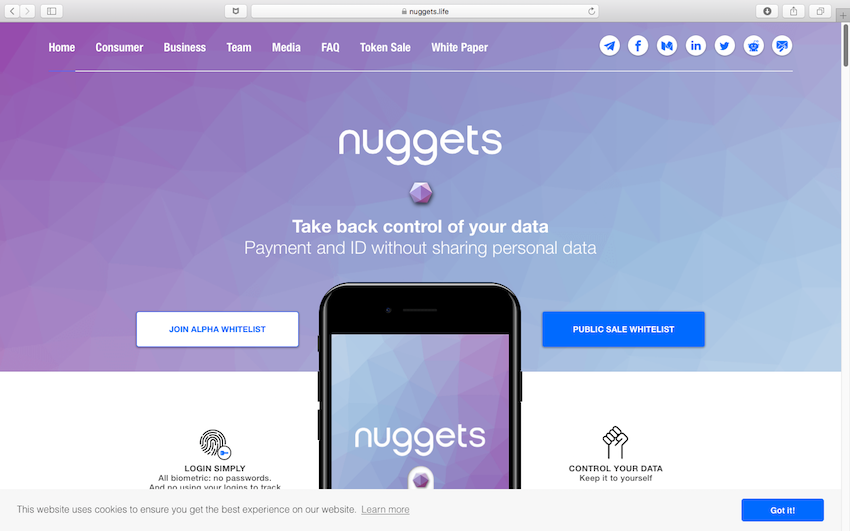

Coin Rivet: What are the main ways in which blockchain can benefit retailers?
Alastair Johnson: I think the real value proposition of blockchain in the retail sector is that it provides both merchants and consumers with an added degree of security. With the use of digital identities (removing the need for usernames and passwords) and zero-knowledge storage, consumers can store their personal information without ever needing to share them with a third party.
As they remain in complete control, it allows for a much safer checkout experience whereby retailers can receive payment without needing to collect sensitive information. For businesses, particularly in light of tightening data privacy legislation (such as GDPR) and increased data breaches, a solution like this vastly lessens their liability as they do not have to store users’ personal information.
On another note, and as something of a side effect of the above, the checkout experience becomes a lot more streamlined, as the consumer simply uses their phone to make payments. In e-commerce in particular, this is crucial in reducing the frequency of forgotten passwords and abandoned shopping carts– a customer no longer has to spend time filling out a form with their address and card details, often thought to be a driving factor in the abandoning of a purchase at checkout. I also think there’s definitely potential for blockchain-based tokens to be explored as a sort of points system for loyalty programmes, which retailers can use to incentivise certain purchases.
Coin Rivet: Critics of blockchain technology argue that it is nebulous technology, there is no real substance to the solutions etc being produced, and that cryptocurrencies are simply get rich quick schemes with extra math. What’s your response and would you say that blockchain is finally living up to the hype?
AJ: I have to disagree strongly. There’s certainly a lot of hype around the tech, and granted, there are some situations in which it’s being marketed where it’s probably not needed. To outright call it nebulous technology, though, would be blatantly false when we’re already beginning to see use cases materialise that solve real problems.
I think the secure storage of data is a pressing issue that needs an answer. There’s a seemingly unrelenting flood of data breaches, wherein sensitive user data – phone numbers, card details, physical addresses – is being siphoned from centralised servers. Companies maintain enormous data silos, filled with information that makes them an ideal target for hackers or malicious parties wishing to leverage this data to sell on.
But now, we have the technology that allows us to disrupt this broken model. Decentralisation allows individuals to opt out of a system where they are essentially entrusting personal information to a company in order to use its services. Instead of trusting single points of failure, we should be aiming to harness encryption and mechanisms like the aforementioned zero-knowledge storage to empower individuals. I fully believe that this is the real ‘killer app’ for blockchain tech: self-sovereignty of data.
Coin Rivet: What for you are the most interesting recent implementations of blockchain technology in retail?
AJ: There are quite a few projects I’m optimistic about. Many are still in alpha, but I have no doubt we’ll see them roll-out soon. I feel that Storiqa has identified a very relevant niche: it aims to eliminate barriers to entry for SME retailers, providing its own wallet that holds a range of cryptocurrencies (making for low fees), and a blockchain-based mechanism for preventing fake reviews.
Devery is another initiative I’m very interested in. Blockchain technology in supply lines has long been one of the possible use cases discussed, and this is something they’re refining to cater specifically to the retail sector. The Devery system is attempting to bring a much-needed level of transparency to ecommerce supply chains, helping to prevent counterfeiting and ensuring that goods are delivered in an acceptable condition. I’m a fan of their open source protocol which is built so as to allow developers and enterprises to build decentralised applications on top of it.
I’m sure that, as time goes on, we’ll see a lot more innovative solutions being deployed in the arena. I look forward to integrating our own project with a range of these to facilitate retail in the digital age.
Denver, Colorado, 24th February 2025, Chainwire
Denver, Colorado, 20th February 2025, Chainwire
Washington, D.C., 18th February 2025, Chainwire
Dubai, UAE, 27th January 2025, Chainwire
Those who enter the market at this time may be surprised to hear that Bitcoin…
George Town, Grand Cayman, 22nd November 2024, Chainwire